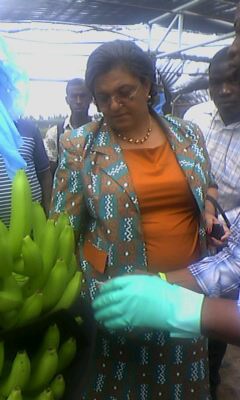Ghana would take steps to protect her economic interest if the Economic Community of West African States’ (ECOWAS) platform for the full Economic Partnership Agreement (EPA) failed to reach a consensus within the stipulated time-frame.
Ms Hanna Tetteh, Minister of Trade and Industry said this on Wednesday during a working visit to the Golden Exotics Limited (GEL), a banana and pineapple producing and exporting Free Zone Company operating at both Asutuare and Nsawam.
Speaking at the company’s 1,200 hectares of banana plantation at Asutuare in the Eastern Region, she conceded there would be export revenue losses from import duties on goods from the European Union (EU) under the trade agreement, but stressed that eventual signing of the full EPA would bring socio-economic gains.
Ms Tetteh stressed that the loss of revenue from import duties should be weighed against a situation where there would be considerable loss of export revenue in the event that Ghana’s exports were denied entry into the European market.
EPA is a scheme to create a Free Trade Area (FTA) between the European Union and the African, Caribbean and Pacific (ACP) countries. They are a response to continuing criticism that the non-reciprocal and discriminating preferential trade agreements offered by the EU are incompatible with World Trade Organisation (WTO) rules.
The EPA is a key element of the Cotonou Agreement, the latest agreement in the history of ACP-EU Development Cooperation, and was supposed to take effect from 2008 but the negotiations are not yet completed. The new completion date is January 1, 2014.
Ghana initialed an interim EPA in 2007 and the agreement allows pineapple and banana producers access into the European market quota and tariff-free.
Ms Tetteh said Cote d'Ivoire had signed the EPA, adding that if Ghana refused to sign the agreement, it would lose exporters operating in the country to the Ivorians.
She observed that the EU had rolled out a Banana Accompanying Measures in a form of grant to assist exporters in Ghana to be competitive and self-sustaining.
Ms Tetteh said government and the traditional rulers of Asutuare were negotiating to acquire more land to build affordable staff housing facilities for the Golden Exotics Limited (GEL) workers.
Mr. Jean Marie Tchonang, Production Manager of GEL, told journalists that training for workers was critical if the company was to increase in size and compete on international markets.
He said the company exports 80 per cent of its produce to the European market with the rest being sent to Burkina Faso, Mali and Niger.
GEL, which produces mainly Grande Naine and William varieties of bananas, has targeted to export 55,000 metric tonnes this year.**
Business News of Thursday, 28 June 2012
Source: GNA
Ghana will protect her economic interest if ECOWAS-EPA fails - Ms Tetteh

















